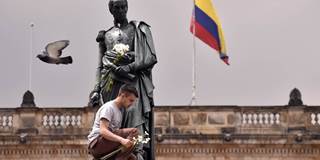The Making of a Peacemaker: An Interview with President Juan Manuel Santos
One of the few encouraging political developments of 2016 was the Colombian government’s peace agreement with the country’s FARC guerrillas, ending a half-century of violent insurgency. How was the deal with the FARC achieved, and what lessons does Colombia’s peace process hold for political leaders elsewhere?
Nobel Peace Prize winner, Colombian President Juan Manuel Santos, and Shlomo Ben-Ami, a former Israeli foreign minister, discuss what world leaders should learn from the making of Colombia’s historic peace accord with the FARC guerrillas. The interview was conducted by Shlomo Ben-Ami.
SBA: Given your record as a military hawk when you served as President Álvaro Uribe’s defense minister, and the fact that Colombia was on the verge of war with Venezuela and Ecuador – both countries having given ideological and logistical support to the FARC – your shift to peacemaking surprised many people. Can you elaborate on how and why this happened?
JMS: There was no shift. Past attempts to negotiate with the FARC failed because the conditions were not ripe. Two of those conditions were military advantage, so that the government could negotiate from strength, and the support of the region. What I did was to create those conditions – the first through military effectiveness, and the second through pragmatic diplomacy.
SBA: How would you define the role of the late Venezuelan President Hugo Chávez and Cuban President Raúl Castro in the process?
JMS: I must say that both Chávez and Castro were extremely helpful throughout the entire process. Their influence on the FARC was a determining factor in pushing them in the right direction.
